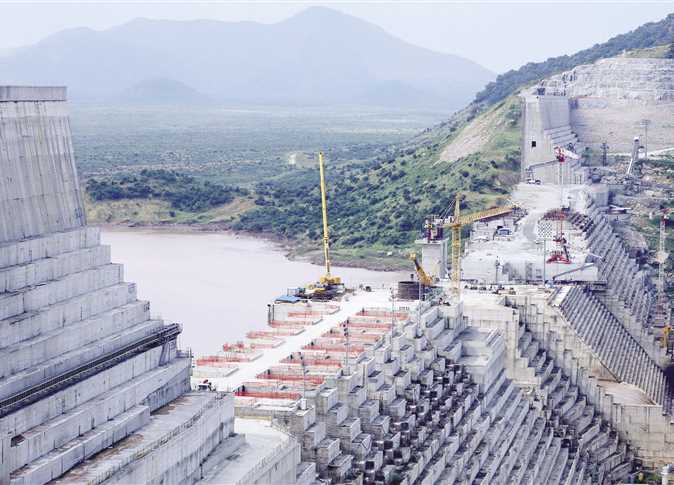
BY HAILE DEMEKE
Trilateral negotiation among Ethiopia, Sudan and Egypt over Grand Ethiopian Renaissance Dam (GERD)which has been going on for quite a decade has continued to be unfruitful. The three countries failed to strike a deal over the filling and operation of the giant hydropower. Egypt and Sudan are to blame though.
Despite the delay in negotiation, the construction of the colossal dam is progress well reaching 79 percent of completion. Last year, Ethiopia achieved the first phase of GERD’s reservoir filling without coordination with the downstream countries. Ethiopia also reaffirmed that it would launch the filling of the second phase even if no deal was struck between the three countries.
With talks deadlocked, now the two downstream countries Egypt and Sudan call for international mediation to get involved in a foiled attempt to internationalize the matter.
Sudan formally requested the African, the European Union, the United Nations and the United State to mediate the stalled process over the filling and operation of the GERD, the Sudan Tribune reported.
“The Sudanese Prime Minister, who returned from Cairo on Friday, sent a message to the United Nations Secretary-General, the President of the Democratic Republic of Congo who is also the Chairperson of the African Union, the EU High Representative of the Union for Foreign Affairs and Security Policy, and the U.S. Secretary of State, requesting their mediation in the GERD process,” a senior official told the Sudan Tribune lately.
During AbdallahHamdok’s visit, Cairo officially renewed its support for the Sudanese proposal to stop direct talks and establish international mediation headed by the African Union with an active mandate to break the deadlock in the tripartite negotiations over the GERD.
The Ethiopian government recently announced, through the official spokesman of the Ministry of Foreign Affairs, its acceptance of the African Union mediation without explicitly rejecting the European Union, America and the United Nations. This is not the first time the two countries have sought international mediation.
Egypt had previously called on the international community to get involved in the talks. Then after that US, UN and World Bank had taken part in the talks as observers. Later, the role of US had changed and Washington became mediator in the talks. Following that Ethiopia withdrew from the talk for the first time since the beginning of the negotiations. The U.S.was trying to force Ethiopia to accept the proposal made by the US government.
Ambassador Ibrahim Idris is Trans-Boundary Rivers Advisor at the Ministry of Foreign Affairs andmember of GERD negotiating team. He told The Ethiopian Herald that Ethiopia is committed and working firm to use the resource in an equitable and reasonable manner abiding by international rule of trans-boundary natural resources.
The two downstream countries,Egypt and Sudan,have called for international involvement in the talks recently. This indicates the countries’ disregard forrole of the African Union. In addition, they want to exert an unnecessary pressure on Ethiopia so as to delay the filling of the dam. There is no legal ground that prohibits Ethiopia from achieving the second round filling though.
At the time Ethiopia agreed to the mediation, the two countries asked the country to stop the project and then negotiate on the issue. The three countries then agreed that the construction of the dam is inseparable from the filling of the dam according to the principle 5 of the Declaration of Principles(DoP) signed in 2015. What they wanted now is that they want to create conflict between Ethiopia and the mediators. Their primary goal is halting the Ethiopian development, however.
Regarding the international mediation, Amb. Ibrahim said that this approach is possible if only the three countries agree on the matter according to article 10 of the DoP. But now only Sudan and Egypt are asking for international mediation rejecting Ethiopia’s position. This runs against DoP. The mediation must be concluded among the three countries under the auspices of the AU.
Ethiopia is the only upper riparian country in the world begging for downstream countries for fair and equitable utilization of resources. The genuine stance and effort of Ethiopia in nurturing fair and equitable utilization of the river among riparian countries is the right move and will lead to inclusive regional development, the Ambassador added.
Expert of Trans-Boundary Rivers and member of GERD negotiating team Dr. WubalemFekadefor his part said that Ethiopia is showing a good will to downstream states. Ethiopia, though being upper riparian country and the highest contributor of the Nile River, is literarily begging for a deal. On the contrary, Egypt is negatively portraying the dam using different words which is nothing to do with the project. They are using words like unilaterally, risky, controversial, and others mainly to mislead and internationalize the issue, he added.
The project is a multilateral initiative, it is not unilateral. It benefits the wide region.
Sudan is very much aware of the benefit of the dam. However, it is playing back and forth allying with Ethiopia and Egypt in different times. Now Sudan had joined Egypt in calling for international mediation. This is not helping.
Water, Irrigation and Energy Minister, Engineer SileshiBekele (Ph.D) said that Ethiopia is negotiating for equitable and reasonable water utilization without causing significant harm to the downstream countries. The repeated narratives of Egypt and Sudan claiming that Ethiopia unilaterally filled the dam in the rainy season of 2020 arenot true.
The three countries have agreed as the stage-based construction of the dam is inseparable from the stage-based filling of the dam according to the principle 5 of the Declaration of Principles signed in 2015.
Principle 5 of the Declaration of Principles signed in 2015, indicates that “the three countries agree on guidelines and rules on the first filling of GERD which shall cover all different scenarios, in parallel with the construction of GERD”. Ethiopia is committed to concluding the trilateral negotiation under the auspices of the African Union.
The second round filling will proceed in the coming Ethiopian rainy season. The dam fulfills all safety standards and is appreciated by experts of the downstream countries, the Minister added.
Professor of Geopolitics in African Studies at Addis Ababa University Professor TesfayeTafessesaid that the downstream countries are following win-lose approachthan win-win approach. The call for the involvement of quartet negotiation is merely to internationalize the issue. The two countries Egypt and Sudan are trying to internationalize the issue to further exacerbate the problem. Diplomacy is the only way forward for all of us to create win-win situation. This will undermine peace and security of the horn of Africa countries.
Sudan’s claim that the first stage filling caused a risk to its population is not substantiated. On the contrary, GERD protected the Sudanese population from more floods and it will in the future provide more resilient and flood managed water flow to Sudan.
The repeated narrative of Egypt and Sudan that Ethiopia unilaterally filled the dam in the rainy season is not true. The second phase filling retaining an additional 13.5BCM will proceed in July and August of 2021 accordingly. Ethiopia respects the agreement on Declaration of Principles (DOP) and is also committed to the trilateral negotiation under the auspices of the AU.
Spokesperson ministry of foreign affairs (MoFA) Ambassador Dina Mufti said this week that the downstream countries Sudan and Egypt are requesting forinvolvement of quartet parties over the dam negotiation. Such kind of call didn’t reach Ethiopia officially. The two organizations European Union (EU), United States (US) are among the observers of the tripartite talks previously. The African Union (AU) is a coordinator of the negotiations, he added.
“The main reason why the last negotiations came to halt is that Sudan wanted the role and number of observers increasedbut Egypt rejected the idea at that time.”
Now the idea ofquartetmediation hascome to the spotlight. “The tripartite negotiation is negotiation by itself. The coordinator is responsible for facilitating the situation so as to create conducive environment for the talks not to dictate the talks. The negotiation will be fruitful only through tripartite talks. We do have great respect for the AU”.
Ethiopia has a firm stance that the negotiation should be concluded by the three countries, not by mediators. The role of the mediators should remain to coordinate the negotiation table. Ethiopia is always ready for negotiations and committed to the principle of seeking African solutions to Africa’s problems and any proposal of involving mediators in the GERD Talks is unacceptable.
The Ethiopian Herald March 19/2021


